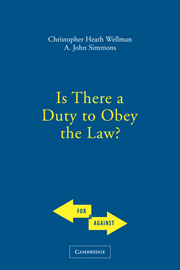4 - Confronting Injustice
Published online by Cambridge University Press: 05 June 2012
Summary
Even if there is a general moral duty to obey the just laws of a legitimate regime, it remains an open question how one should respond when confronted with either an unjust law or an illegitimate regime. The answer to this question will in many cases be quite complicated. At a minimum, though, I contend that there is a general obligation to obey neither unjust laws nor any law of an illegitimate regime. More ambitiously, I submit that there are potentially weighty moral reasons to actively resist unjust laws and illegitimate regimes.
Illegitimate Regimes
In developing my argument for the duty to obey the law, I have been assuming throughout that the laws in particular were just and that the regimes in general were legitimate. In this section, I want to explore whether we are similarly obligated to obey the legal commands of an illegitimate regime. I will advance a number of theses, but the two most basic are that (1) there is no general duty to comply with the laws of an illegitimate regime, and (2) there are actually moral reasons to resist illegitimate governments.
Here I will restrict my discussion to two countries: Iraq under Saddam Hussein, which I will assume was an illegitimate military dictatorship, and apartheid South Africa, which I understand to have been an illegitimate regime that wrongly oppressed blacks.
- Type
- Chapter
- Information
- Is There a Duty to Obey the Law? , pp. 74 - 90Publisher: Cambridge University PressPrint publication year: 2005



